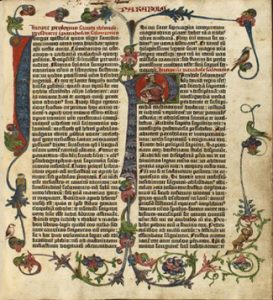It’s time for a new Reformation, one that kicks out professors
 One of the keystones of the Protestant Reformation was the notion that priests were no longer necessary to bring people into contact with God. Up until the Reformation, Catholic priests were seen as an absolutely necessary intermediary. No matter how corrupt the individual priest (and if Boccaccio and Chaucer are to be believed, individual priests were very licentious indeed), his ordination meant that he was a vital conduit between man and God.
One of the keystones of the Protestant Reformation was the notion that priests were no longer necessary to bring people into contact with God. Up until the Reformation, Catholic priests were seen as an absolutely necessary intermediary. No matter how corrupt the individual priest (and if Boccaccio and Chaucer are to be believed, individual priests were very licentious indeed), his ordination meant that he was a vital conduit between man and God.
The revolutionary notion that Christians could go the Jewish route and have teachers about God, rather than conduits to God, began in the 14th century. In 1382, John Wycliffe translated portions of the New Testament from Latin into English. He believed that the only authoritative source for the scriptures came from the words themselves, rather than from a priest’s summation and opinion. With the Bible in the vernacular, the priest was no longer the guardian of information unavailable to just about everyone else in Western European society. From there, it was a short step to conclude that the priest was entirely unnecessary. Man was saved, not when the priest administered the sacrament, but when each man himself embraced Christ and his teachings.
The Catholic Church, aided by European states that drew a significant part of their secular authority from the Church’s recognition of their monarch’s divine right to rule, was able to stifle this growing reform movement for some time. The Church might have been able to destroy the reform movement entirely but for an information revolution. In 1454, Johannes Gutenberg published a Bible on a printing press capable of endlessly replicating that printing run. Suddenly, not only was the priest doctrinally redundant, he was redundant as a practical matter. Any literate person could read the people and reach his (or her) own conclusions about faith without an intermediary. Nations that embraced the Reformation speeded this process by translating the Bible into their native languages.
Today’s Left has undertaken to supplant the Christian religion with secularism. In the new leftist religion, the professors are the priests and the universities the Cathedrals. For many a long decade, the professors have been the guardians of information unavailable to ordinary Americans. However, we are at the dawn of a second information revolution. The internet has matured to the point that information is available en masse and instantly at our fingertips.
Ironically, Google, which is hard Left, is one of the main institutions making all of this information available. In addition to Google, though, government institutions all over the Western world are making their archives available on-line. The next big education revolution will be a hierarchical search engine making it possible easily to access this information by topic, rather than just by the institution that’s put them on-line. (Just for fun, go here and check out the endless list of original text American documents available at your fingertips.)
As such, one has to ask, are professors needed anymore to interpret information? Do we need these self-styled, hard-Left, and often batshit crazy, guardians of knowledge? Are they a necessary, irreplaceable intermediary between ordinary people and the vast body of information out there? One can argue that they provide a useful service insofar as they separate wheat from chaff, but I think it’s pretty clear looking at the convulsions at college campuses across America that, if professors are indeed winnowing the grain, they’re keeping the chaff and tossing the wheat.
As long as there are still skills one needs to master, it’s arguable that professors still serve a useful function — mostly in the STEM area of education. However, when it comes to history, literature, social studies, etc., I do believe its time to throw out this self-anointed priesthood and allow people to seek information on their own, whether through texts or videos. It is time for a new Reformation!
